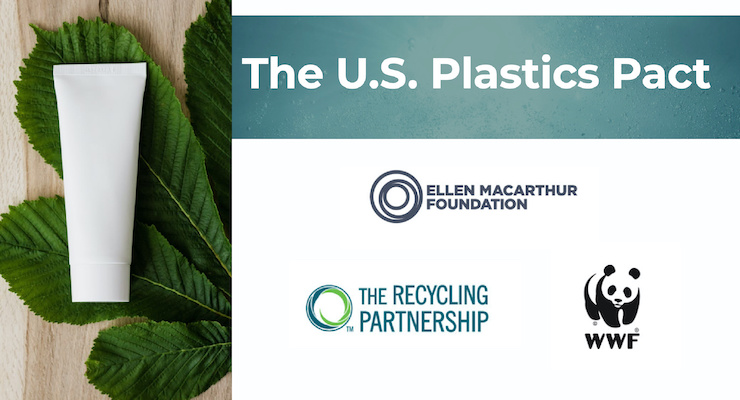Marie Redding, Senior Editor08.25.20
The U.S. Plastics Pact launched today -- and the collective effort is taking on the plastic waste problem in the U.S.
The solution? Make sure all plastic packaging is reusable, recyclable, or compostable by 2025.
The U.S. Plastics Pact includes more than 60 major brands, retailers, government agencies, and more, all united in igniting change -- by creating a circular economy for plastic in America.
The Recycling Partnership and WWF (World Wildlife Fund) are leading the effort, joining the larger Ellen MacArthur Foundation’s global Plastics Pact network, which has more than 850 members.
Erin Simon, head, Plastic Waste and Business at WWF, says, “Plastic pollution is a global crisis that needs local solutions, and the United States is one of biggest opportunities where regional interventions can result in transformative change around the world.”
Simon adds, “We see the U.S. Plastics Pact as the linchpin for uniting the critical stakeholders—industry leaders, waste management systems, and policymakers—under a common vision and action plan for meaningful, measurable impact.”
The Goals
By joining the U.S. Plastics Pact, members agree to 4 goals -- starting with defining problematic or unnecessary packaging by next year, and then take measures to eliminate them by 2025.
Members also agree that all plastic packaging will be 100% reusable, recyclable, or compostable by 2025. They also agree to undertake "ambitious actions" to effectively recycle or compost 50% of all plastic packaging by 2025.
And the last goal to meet by 2025 is to ensure that all plastic packaging contains at least 30% recycled content, on average, or responsibly sourced bio-based content.
Unilever & Target Are On the Advisory Council
L'Oreal just announced it has joined -- and Target, Unilever, and Walmart are among the ten companies on the U.S. Plastics Pact's advisory council (see the others below). The council will "maintain continual and effective collaboration among members."
Viviana Alvarez, Head of Sustainability - North America at Unilever, says, “We can start to address the plastic waste issue by taking fast and transformative action at every point in the plastic cycle. Recycling alone can’t solve the circular economy, but the circular economy can help solve the problem on waste and recycling."
Alvarez adds, "Keeping plastic in the economy and out of the environment will require everyone to work together - whether that’s product designers, governments, consumers, or the waste management industry.”
Amanda Nusz, vice president of corporate responsibility, Target, says, "We’re proud to help drive progress toward a circular economy for plastic.”
The Advisory Council members are:
- Amcor
- Balcones Resources Inc.
- Austin Resource Recovery (City of Austin, TX)
- Eureka Recycling
- Grove Collaborative
- Mars Inc.
- Target
- The Coca-Cola Company
- Unilever United States
- Walmart, Inc.
Transparent reporting is key -- and the progress of the U.S. Pact will be tracked through WWF’s ReSource: Plastic Footprint Tracker. It provides a standard methodology to track companies’ plastic footprints and publicly report on their plastic waste commitments each year.
The report will be made publicly available each year.
The next step for the U.S. Plastics Pact will be to create a roadmap, laying out the steps to achieving the targets outlined above.
Sarah Dearman, VP of Circular Ventures for The Recycling Partnership, adds, “As the lead organization that engages the full supply chain to advance circularity in the U.S., it’s a natural fit for us to further collaborate with other industry leaders to create substantial, long-lasting change for our planet."
Read More
Henkel North America Joins U.S. Plastics Pact
L’Oréal Joins U.S. Plastics Pact




























